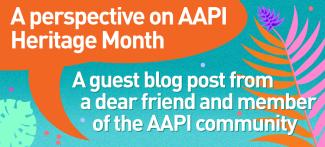
Honoring AAPI Heritage Month: Celebrating Diversity and Advancing Opportunities
By Natalie DeLaCruz, guest contributor
May is recognized as AAPI Heritage Month, a period dedicated to honoring the abundant and diverse contributions of the Asian American & Pacific Islander (AAPI) community to American society.
In the wake of the pandemic, our community has faced a difficult surge in negative rhetoric as well as the distressing rise of anti-Asian hate crimes. In the face of such challenges, it makes it hard to have a positive outlook. Consequently, the allocation of a month to commemorate our heritage serves as a time for introspection, connection, and progression.
This year’s theme, as designated by the Federal Asian Pacific American Council, is Advancing Leadership Through Opportunity. This prompts us to consider the ways we can empower individuals within the AAPI community. An important starting point is to re-evaluate any preconceived biases we may have. For example, challenging the stereotype that all Asian Americans are inherently affluent and successful. This is one aspect of the “model minority” myth, a common narrative that may appear superficially flattering, but its deeper implications are harmful. By exaggerating the success of Asian Americans, it is also homogenizing their experience. Unfortunately, this myth has permeated our society, resulting in all-too-common microaggressions.
As an AAPI person, I’ve experienced the “model minority” myth in academic settings, where assumptions are made about our aptitude for mathematics and other STEM subjects. When we struggle in these subjects, we are met with confusion or simply ignored. Math has never been my strong suit, and when I would ask questions in class, all too often I would be confronted with the comment, “You’re Asian. Aren’t you supposed to be good at math?” Comments like this discouraged me (and perhaps other AAPI students) from seeking assistance from our peers. Similar harmful comments dissuade many AAPI people from seeking help in various aspects of their lives. For example, Asian Americans have higher income levels on average, yet only one in four work with a financial professional. Consequently, those who would benefit from these services are often left to navigate complex financial matters on their own.
The repercussions of the model minority myth most significantly impact marginalized groups within the AAPI community. Seventy-one percent of Asian American adults were born outside of the United States, and among those immigrants, only 57 percent are proficient in English. These individuals often face significant cultural and linguistic barriers to accessing necessary services. AAPI people who identify as Native Hawaiian, Pacific Islander, and/or who hold intersecting identities, including belonging to the LGBTQ+ community, are the most likely to experience economic hardship. By assuming universal affluence within the AAPI community, we ignore the struggles of those who do not conform to this stereotype.
Moreover, financial service providers rarely target the AAPI community as a group in need of support, but, in reality, Asian Americans exhibit the widest income disparity of any racial group in the United States. Millions of AAPI people live in poverty, without easy access to financial services that are tailored to their specific circumstances. Asian Americans are least likely to feel comfortable with their financial situation. Every time someone makes a comment that perpetuates the model minority myth, it represents a microaggression that serves to uphold a narrative that creates harm in our community. Simple things, such as automatically assuming an Asian person you meet is rich is an indication that you fail to recognize the diverse experiences within our community.
There are tangible ways that we can collectively support the AAPI community this month and beyond. There is a need for greater visible diversity in employment and in advertisements across all industries, including financial services. Representation is critical and plays a key role in shaping perceptions. It wasn’t until my last year of high school that I had the privilege of being taught by an Asian American teacher. After the first day of class, I emailed her in tears expressing how much it meant for me to finally have an academic role model who looked like me. We were able to form a deep connection that remains intact to this day because of our shared identity.
It was only a few years ago that I began to see advertisements featuring Asian Americans. Seeing someone who resembles you in an advertisement allows you to visualize yourself utilizing that product/service. Furthermore, when companies hire AAPI employees, especially in client-facing roles, it fosters a deeper sense of connection between clients and companies. Language barriers also present a significant obstacle in advertising and other forms of communication. Given that less than 60 percent of AAPI immigrants are proficient in English, providing materials in their native languages and hiring employees who are bilingual and multilingual would greatly enhance their likelihood of engaging with the services offered.
On an individual level, it’s important to acknowledge and challenge any biases we hold and actively work to overcome them. Do you ever ask an AAPI person where they’re “really” from or assume that an AAPI person is rich? Can, perhaps, this year’s AAPI Heritage Month represent an opportunity for you to challenge and dispel these assumptions? We all have a role to play in creating a society where every individual can thrive. It is essential to critically examine our perceptions of the AAPI community and compare them with the true reality of our diverse society.
Natalie DeLaCruz is a Filipino-American and a rising third-year Political Science & Human Services student at Northeastern University. She is the daughter of Laura DeLaCruz, MKP’s Director of Project Management and Business Development. Natalie is passionate about diversity, equity, and inclusion, she works as the Youth Engagement Specialist for Herren Project and will be serving as the Vice President of DEI for Northeastern’s Student Government in the fall.
Linkedin: https://www.linkedin.com/in/natalie-delacruz/
Instagram: @natalie4thefuture